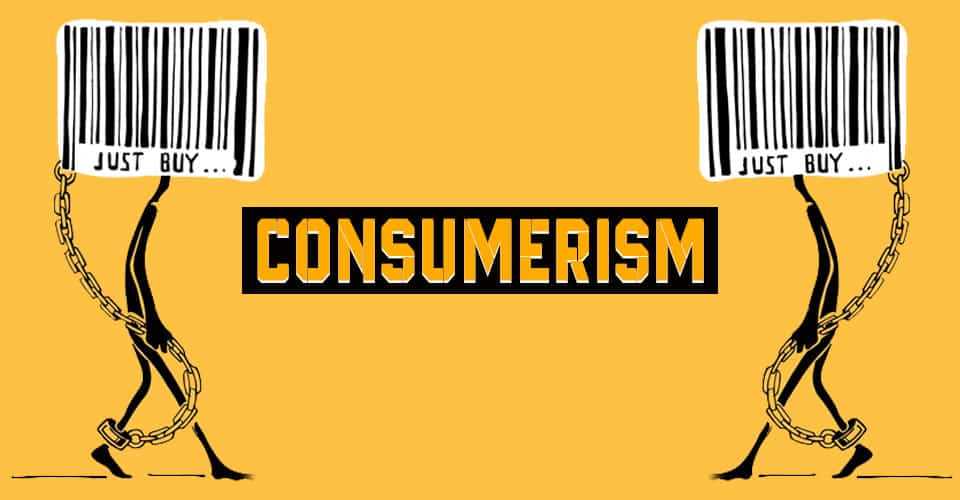Consumerism Explained: Definition, Economic Impact, Pros & Cons

However, consumerism also has its drawbacks. One of the main concerns is the environmental impact of excessive consumption. The production and disposal of goods and services contribute to pollution, resource depletion, and climate change. Moreover, consumerism can lead to overindebtedness and financial instability for individuals who rely on credit to sustain their consumption habits.
Another negative consequence of consumerism is the emphasis on material possessions as a source of happiness and self-worth. This can lead to a culture of materialism and a constant desire for more, which can be detrimental to personal well-being and mental health.
Definition of Consumerism

Consumerism is a socio-economic phenomenon that revolves around the excessive acquisition and consumption of goods and services by individuals or households. It is driven by the belief that happiness and fulfillment can be achieved through the constant accumulation of material possessions.
At its core, consumerism is a cultural ideology that promotes the idea that personal well-being and social status are determined by the ability to purchase and display luxury items. It is fueled by advertising, marketing strategies, and societal pressures that encourage individuals to constantly seek out new products and experiences.
Consumerism is often associated with a throwaway culture, where goods are quickly discarded and replaced with newer, trendier versions. This mindset contributes to the depletion of natural resources, environmental degradation, and waste generation.
Origins of Consumerism

The roots of consumerism can be traced back to the Industrial Revolution in the 18th and 19th centuries. As mass production became possible, goods became more affordable and accessible to a wider range of people. This led to a shift in societal values, with an increasing emphasis on material possessions as a measure of success and happiness.
Consumerism gained further momentum in the 20th century with the rise of advertising and the development of consumer culture. Companies began to use persuasive marketing techniques to create desire and demand for their products, influencing consumer behavior and shaping societal norms.
Impact of Consumerism
Consumerism has both positive and negative impacts on individuals, society, and the economy. On one hand, it drives economic growth and creates jobs, as increased consumption leads to increased production and demand for goods and services. It also provides individuals with a sense of identity and self-expression through the products they choose to consume.
However, consumerism also has negative consequences. It contributes to income inequality, as those with higher incomes are able to consume more and thus enjoy a higher standard of living. It also perpetuates a cycle of debt and financial insecurity, as individuals may feel pressured to keep up with the latest trends and make purchases beyond their means.
Furthermore, consumerism has significant environmental impacts. The production, transportation, and disposal of goods contribute to greenhouse gas emissions, pollution, and resource depletion. It also leads to the generation of waste, as products are often discarded after a short period of use.
| Positive Impacts | Negative Impacts |
|---|---|
| – Economic growth and job creation | – Income inequality |
| – Self-expression and identity | – Debt and financial insecurity |
| – Environmental degradation and waste generation |
Economic Impact of Consumerism
Employment
Consumerism plays a crucial role in driving employment and job creation. As individuals continue to consume goods and services, businesses need to produce and supply these products, leading to the creation of jobs. This includes not only jobs in manufacturing and retail sectors but also in related industries such as transportation, marketing, and customer service. Consumer demand drives businesses to expand and hire more employees, contributing to overall economic growth and reducing unemployment rates.
Economic Growth
Consumerism is a key driver of economic growth. When individuals spend money on goods and services, it stimulates demand, which in turn leads to increased production and sales. This cycle of consumption and production fuels economic growth, as businesses invest in new technologies, expand their operations, and create more jobs. Increased consumer spending also leads to higher tax revenues for governments, which can be used to fund public services and infrastructure development.
However, it is important to note that consumerism alone cannot sustain long-term economic growth. It needs to be balanced with other factors such as investment in innovation, education, and infrastructure to ensure sustainable development.
Environmental Sustainability
However, consumerism also presents an opportunity for promoting environmental sustainability. As consumers become more aware of the environmental impact of their choices, they can demand and support sustainable and eco-friendly products. This can drive businesses to adopt more sustainable practices, such as using renewable energy sources, reducing waste, and implementing recycling programs. Additionally, consumer demand for sustainable products can create new market opportunities and drive innovation in green technologies.

Emily Bibb simplifies finance through bestselling books and articles, bridging complex concepts for everyday understanding. Engaging audiences via social media, she shares insights for financial success. Active in seminars and philanthropy, Bibb aims to create a more financially informed society, driven by her passion for empowering others.
